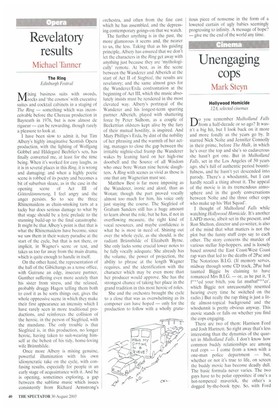Revelatory results Michael Tanner
The Ring
Edinburgh Festival Mixing business suits with swords, rocks and 'the cosmos' with executive suites and cocktail cabinets in a staging of The Ring — something which was inconceivable before the Chereau production in Bayreuth in 1976, but is now almost de rigueur — can be rewarding, though rarely a pleasure to look at.
I have been slow to admit it, but Tim Albery's highly imaginative Scottish Opera production, with the lighting of Wolfgang Gabel and Hildegard Bechtler's sets, has finally converted me, at least for the time being. When it's worked for easy laughs, as it is in several places in this Ring, it is wrong and damaging; and when a highly poetic scene is robbed of its poetry and becomes a bit of suburban sleaze, as in the case in the opening scene of Act III of Gotterdiimmerung, I feel angry and the anger persists. So to see the three Rhinemaidens as chain-smoking tarts at a tacky bar does serious damage to what by that stage should be a lyric prelude to the stunning build-up to the final catastrophe. It might be that Albery's point is that that is what the Rhinemaidens have become, since we saw them in their watery paradise at the start of the cycle, but that is not there, or implicit, in Wagner's score or text, and takes us too far away from the main drama, which is quite enough to handle in itself.
On the other hand, the representation of the hall of the Gibichungs as a tense office, with Gutrune an edgy, insecure partner, Gunther suffering even more acutely than his sister from stress, and the relaxed, probably druggy Hagen telling them both to cool it as he sorts things out, gives the whole oppressive scene in which they make their first appearance an intensity which I have rarely seen in more traditional productions, and reinforces the collision of the heroic, in the person of Siegfried, with the mundane. The only trouble is that Siegfried is, in this production, no longer heroic, having taken to suit-wearing himself at the behest of his tidy, home-loving wife Briinnhilde.
Once more Albery is mixing genuine, powerful illumination with his own idiosyncratic take on the cycle, with confusing results, especially for people in an early stage of acquaintance with it. And he is opening, sometimes exploring, a gap between the sublime music which issues consistently from Richard Armstrong's orchestra, and often from the fine cast which he has assembled, and the depressing contemporary goings-on that we watch.
The further anything is in the past, the more glamorous it seems and, the nearer to us, the less. Taking that as his guiding principle, Albery has ensured that we don't let the characters in the Ring get away with anything just because they are 'mythologically' remote. At best, as in the scene between the Wanderer and Alberich at the start of Act H of Siegfried, the results are revelatory; and the same almost goes for the Wanderer/Erda confrontation at the beginning of Act III, which the music absolutely insists must be rendered in the most elevated way. Albery's portrayal of the Wanderer and his longest-term sparring partner Alberich, played with shattering force by Peter Sidhom, as a couple of Beckettian oldsters kept alive by the fury of their mutual hostility, is inspired. And Mary Phillips's Erda, by dint of the nobility of her phrasing and the warmth of her acting, manages to close the gap between the irritable nightie-clad frump the Wanderer wakes by leaning hard on her high-rise doorbell and the Source of all Wisdom who once bore Wotan nine heroic daughters. A Ring with scenes as vivid as those is one that any Wagnerian must see.
Matthew Best is far more imposing as the Wanderer, ironic and aloof, than as Wotan; though the part proved vocally almost too much for him, his voice only just staying the course. The Siegfried of Graham Sanders still has a huge amount to learn about the role, but he has, if not in overflowing measure, the right kind of vocal resources, and maybe confidence is what he is most in need of. Shining out over the whole cycle, as she should, is the radiant Briinnhilde of Elizabeth Byrne. She only lacks some crucial lower notes to be fully vocally adequate. She already has the volume, the power of projection, the ability to phrase at the length Wagner requires, and the identification with the character which may be even more than her producer would approve. She has the strongest chance of taking her place in the grand tradition in this most heroic of roles.
She and the orchestra brought the cycle to a close that was as overwhelming as its composer can have hoped — only for the production to follow with a wholly gratu
itous piece of nonsense in the form of a lowered curtain of ugly babies seemingly progressing to infinity. A message of hope? — give me the end of the world any time.


























































 Previous page
Previous page